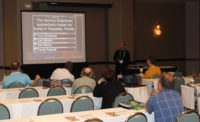Technology is rapidly changing, and nowhere is that more apparent than in the HVAC industry. It is more important than ever for HVAC instructors to keep up with these changes, and 750 teachers did just that by attending the 12th annual HVAC Excellence National HVAC Educators and Trainers Conference in Las Vegas.
There was a great deal of energy in the air and exchanging of ideas, as instructors traversed the 50-plus sessions offered. A key concern among all in attendance was the continual problem of not being able to find enough qualified individuals to fill all the open positions in our industry.
Wayne Turchetta addressed this issue on behalf the Mechanical Service Contractors of America (MSCA). He explained that while MSCA member companies offer some of the most sought-after career opportunities, they also struggle to find enough qualified entry-level technicians. As part of his discussion, Turchetta provided insight regarding the difficulties that many instructors face when attempting to place graduates with these companies. To help bridge the gap between HVAC program graduates and some of the most desirable positions in the industry, Turchetta offered to assist in the process of connecting instructors with MSCA member companies in their area who could provide career opportunities to their graduates.
A common discussion throughout HVACR education is how the industry is rapidly changing, yet the funding required to bring new technologies into the classroom has failed to keep pace. Christopher Noonan of Tarrant County Community College provided a firsthand story of how his program, which faced many of the same problems most institutions face, was able to make the dream of creating the Center of Excellence for Energy Technology a reality. This 87,000-square-foot facility represents the epitome of training and acts as a blueprint for other schools to emulate and build upon. Noonan discussed how instructors can engage administration on their terms to help address the long-term economic needs of the community.
Building on this theme of creating world-class HVACR programs, Randy Petit, certified master HVAC educator of HVAC Excellence, stated that great programs begin with great instructors. Petit explained how the depth of knowledge students obtain in class will determine whether they become a parts changer or master technician. Utilizing data compiled by HVAC Excellence, and provided by Warren Lupson, the former director of education for Air-Conditiong, Heating and Refrigeration Institute (AHRI), Petit spoke about the competencies that are often lacking in entry-level technicians. Petit explained that while technologies advance, program hours continue to decline. HVACR instructors are being asked to cover much more material in far less time. Having discussed the problems, solutions, and where the industry is going, he concluded with a quote from President John F. Kennedy: “Let us not think of education only in terms of its costs, but rather in terms of the infinite potential of the human mind that can be realized through education. Let us think of education as the means of developing our greatest abilities, because in each of us there is a private hope and dream, which, fulfilled, can be translated into benefit for everyone and greater strength for our nation.”
Trying to help bridge the education gap, Daikin conducted both lectures and hands-on training sessions for attendees over this three-day “training boot camp” event. It was at these sessions that educators were reminded that there is much more to modern-day HVAC equipment than the traditional, single-speed, ON-OFF systems that have dominated the industry for many decades. Inverter-controlled, modulating equipment, where system capacities fluctuate in response to the heating and cooling needs of a space, is fast becoming the norm. Long gone are the days where untrained or improperly trained service personnel can perform their jobs successfully in the field. This next generation of HVAC technology requires highly skilled technicians, and this fact became even more evident as the training event progressed.
To bring the event to an end, Daikin convened a full-day training event for over 100 eager-to-learn HVACR instructors. It covered the concepts of inverter-controlled and variable refrigerant volume (VRV) systems while focusing on the installation and commissioning of Daikin’s VRV IV-S single phase heat pump combined with the CXTQ A-Coil and gas furnace.
The session started out with a brief overview of the Daikin organization but very quickly got into the nuts and bolts of variable refrigerant flow (VRF) and variable refrigerant temperature (VRT) technologies.
Several members of the Daikin training team were on hand to answer questions from attendees regarding topics that included outdoor unit installation, gas furnace and A-coil installation, low-voltage and high-voltage wiring, best installation practices, system charging, remote control setup, field settings, system commissioning, and more.
Upon completion of this full-day course, attendees were enrolled in Daikin University and received a certificate of completion as well as valuable reference materials, resources, and guides. In addition, attendees received continuing education units (CEUs) from HVAC Excellence.
Howard Weiss is the executive vice president of the ESCO Group. He can be reached at hweiss@escogroup.com.
Publication date: 8/27/2018
Want more HVAC industry news and information? Join The NEWS on Facebook, Twitter, and LinkedIn today!







